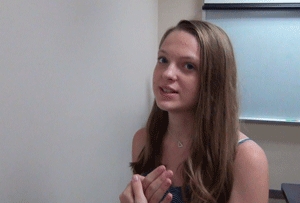National Book Award writer Flannery O’Connor once said that writing is an act of discovery and that good writers, opening a window to the creative process, are often surprised by how their own story develops and where it might take them. But how does a writer begin this journey?
Last week I was privileged to meet and discuss the creative process with young writers attending the Dixon Summer Center for Creative Writing held at Washington College.
The Summer Center, now in its fifth year, hosted eight seven through tenth grade Maryland writers. During the week-long workshop, mentored by Annelle Tumminello, students worked daily to hone their craft through “Socratic seminars on poetry, arguments and using Cynthia Voight’s novel Homecoming as a literary model to discuss.
Like writing a story, I had no idea how my visit would develop and what I might discover there. After all, the group is young, have not entered the knockabout world of high school yet and, not to discount their limited life experience, I wondered how they would interpret their feelings and observations of life with what could be considered a chronological handicap.
There was no handicapping needed here. These young writers knew the fundamentals and spoke eloquently about what the writing seminars meant to them.
I could have stayed for days talking with these young writers. And learned from them. Enthusiasm is one thing—no shortage there—but practicing a craft requiring a complex skill-set (grammar, structure, tone) is another and can leave many enthusiasts sitting (or writing) lazily at the gate to their adventure lacking the tools to express their wonderment.
Each one of the young writers I interviewed had a strong, defined take on their craft. They “talked shop” like young architects describing the structural reasons for Doric columns. Shy, but confident they discussed their workshop experience with Tumminello and how it applied directly to their own writing.
“Seminars are like seed-beds; we scatter ideas and nurture the ones that grow. First, we examine the what and why of a piece: what does it mean; what is the author’s purpose in saying it that way; how does it affect our view of life? Then we analyze the how: what techniques does the author use that we respond to and how can we do that in our own writing? Then we leave seminar for the writing lab and do it, incorporating techniques and responding to texts in our own writing. So workshops allow us to explore a text as writers, yes, and also as humans, Tumminello says.
We look forward to reading more of these aspiring writers!
The following video includes Lauren Bentley, Hannah Davis, Michael Mullaney, Aubrey Clarke and Julia Bentley.
Anne Cameron, Ananya Chand, and Cameil Nelson were also in attendance, and their work may be read in the attached pdf of the student work portfolio.
The Dixon Summer Center for Creative Writing is sponsored by Dixon Valve and Coupling, Maryland State Department of Education and Washington College.
Portfolio: 16StudPub



Marty Stetson says
What a neat thing to do, not just for those attending but for the community. A big thank you to all that made it possible.